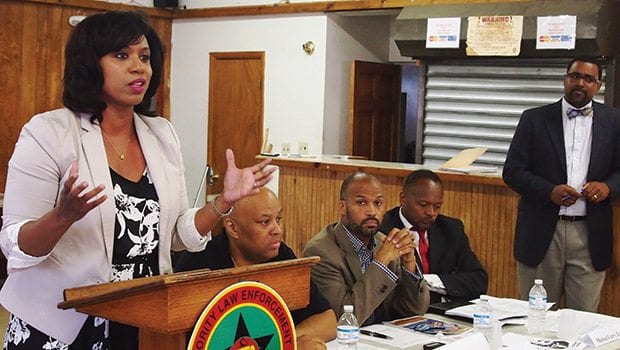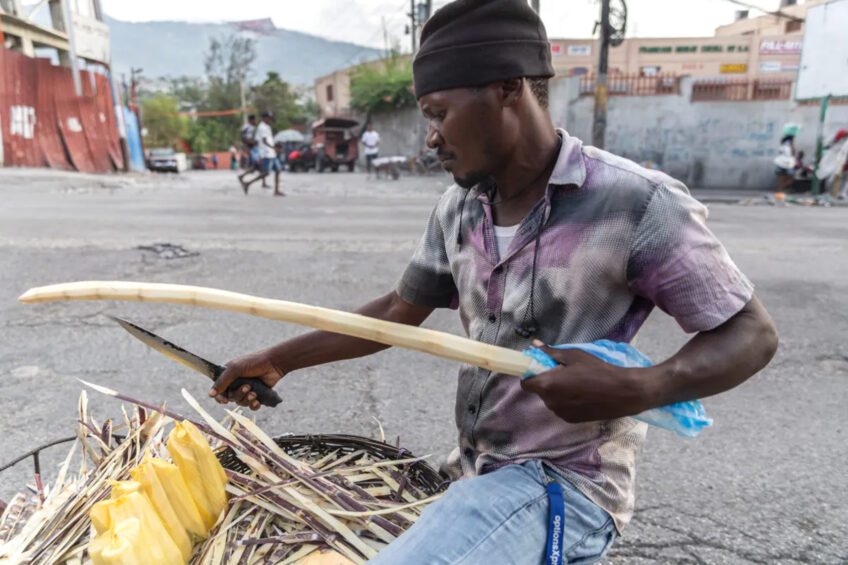
A group of civil rights activists, elected officials and attorneys will soon call on Mayor Martin Walsh to settle longstanding discrimination complaints filed by black officers in the Boston Police Department, reform the system of exams used for hiring and promotion, and take affirmative steps to end police profiling.
The group met last week at the headquarters of the Massachusetts Association of Minority Law Enforcement Officers for a panel discussion on discrimination in the police department.
Likely at the top of their list of demands are several longstanding discrimination cases filed by black and Latino officers that the group claims the Walsh administration ought to settle. The Smith case and Lopez case challenge the department’s use of a multiple choice test for promotions. The Jones case, which goes back 13 years, faults the department for firing black officers after a drug test proven to be flawed found traces of cocaine in their hair.
In the Jones case, the state’s Superior Court and the federal 1st Circuit Court of appeals found in favor of the plaintiff. The Boston Police Department has appealed the federal ruling.
But panelists last week suggested that the city’s continued defense on these cases will contribute to a continuing trend of declining numbers of black officers.
“Walsh should be told he doesn’t have to wait for the courts,” said attorney Harold Lichten, a former attorney for the Boston Police Patrolman’s Union who now is representing black plaintiffs in the Smith and Jones cases. “He could settle these cases, and that’s what he should do.”
Others calling for the resolution of the cases included at-large City Councilor Ayanna Pressley, who argued that the department should use performance metrics for promotions, not a multiple choice test that measures rote memorization.
“This is a very old issue, and the only way we can change it is with a new approach,” Pressley said.

Audience members including police officers and community residents packed into the function room at the Massachusetts Association of Minority Law Enforcement Officers Columbia Road headquarters.
“It’s not based on their leadership skills,” said civil rights attorney Stephen Churchill. “It’s not based on their performance. Basically, you have to memorize and regurgitate knowledge.”
Churchill noted that police departments in many major U.S. cities – and many Massachusetts towns – no longer use civil service tests for hiring or promotions.
The Department’s command staff is the most diverse in its history, with people of color making up 48 percent when superintendents and deputy superintendents are included. But the number of people of color elevated to lieutenant and captain has been declining in recent years, as blacks and Latinos promoted in the 1980s and ’90s reach retirement age.
ACLU attorney Carlton Williams said few other professions use standardized tests for promotions.
“Nobody’s asking me how I scored on the bar exam to give me a promotion,” he said. “They want to know whether or not I’m winning cases.”
MAMLEO President Larry Ellison noted that the department repeatedly has promoted white officers over black officers with the same scores, despite the declining numbers of black and Latino lieutenants and captains.
“We said to the commissioner, ‘If you’re concerned about diversity, it should be at the forefront of your mind when you’re making promotions,’” he said.
Police abuse
In addition to hiring and promotions, the panelists also focused on solutions to police abuse, particularly the widespread practice of stopping blacks, then questioning them and frisking/and or searching them for contraband.
Pressley suggested that the Walsh administration’s plans to revamp the city’s Civilian Ombudsman Oversight Panel should include plans to give the panel the power to initiate and conduct its own investigations and subpoena power, powers the current board does not have. Pressley said the panel should have sufficient resources to take on an increased caseload.
Although data released by the police department last week showed that black and Latino officers are less likely to engage in stop-and-frisk tactics, ACLU attorney Carlton Williams argued that simply bringing on board more black and Latino officers would not substantially change the culture of the department.
“When law firms hire black and Latino associates, do you see a change in the culture of the organization?” he said. “No.”
“People who live in black and brown communities experience policing differently,” said Rasaan Hall, deputy director of the Lawyers Committee for Civil Rights and Economic Justice. “Although Baltimore, Cleveland and Ferguson are far away, the same kindling that can spark an inferno is only a stone’s throw away when a black person is gunned down by police.”






